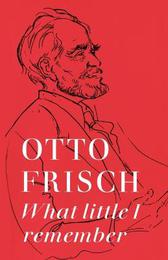
|
What Little I Remember
Paperback / softback
Main Details
| Title |
What Little I Remember
|
| Authors and Contributors |
By (author) Otto Robert Frisch
|
| Physical Properties |
| Format:Paperback / softback | | Pages:240 | | Dimensions(mm): Height 216,Width 141 |
|
| Category/Genre | Popular science |
|---|
| ISBN/Barcode |
9780521280105
|
| Classifications | Dewey:530.0924 |
|---|
| Audience | | Professional & Vocational | | General | |
|---|
| Illustrations |
Worked examples or Exercises
|
|
Publishing Details |
| Publisher |
Cambridge University Press
|
| Imprint |
Cambridge University Press
|
| Publication Date |
30 September 1980 |
| Publication Country |
United Kingdom
|
Description
Otto Frisch took part in some of the most momentous developments in modern physics, notably the discovery of nuclear fission (a term which he coined). His work on the first atom bomb, which he saw explode in the desert 'like the light of a thousand suns', brought him into contact with figures such as Robert Oppenheimer, Edward Teller, Richard Feynman and the father of electronic computers, John von Neumann. He also encountered the physicists who had made the great discoveries of recent generations: Einstein, Rutherford and Niels Bohr. This characterful book of reminiscences sheds an engagingly personal light on the people and events behind some of the greatest scientific discoveries of this century, illustrated with a series of fascinating photographs and witty sketches by the author himself.
Reviews'In writing a charming, light-hearted cameo of his life and times as a scientist, Professor Frisch has revealed more about science than many authors with greater pretensions. This is a book that deserves to be read, and will be enjoyed, by a wide audience.' The Economist 'Despite his modest title, what Frisch 'manages to remember' is quite impressive. He loved to tell stories and his many vignettes of his associates ... include nearly every outstanding physicist who worked in nuclear physics.' Science 'This is a happy book, from which the author's personality and his enjoyment of physics, of music, of life, emerges clearly. It is also a portrait of the pre-War world of physics, of days of small numbers and small apparatus, of times when a physicist could think of an ingenious experiment today and set it up tomorrow.' Nature
|